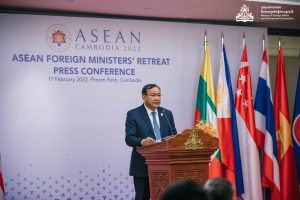Cambodian Foreign Minister Prak Sokhonn will pay a four-day visit to Myanmar later this month for talks with top representatives of the country’s military government, his first official trip as special envoy for the Association of Southeast Asian Nations (ASEAN).
A ministry spokesperson announced yesterday that the trip would take place on March 20-23. While details of the Sokhonn’s agenda have apparently not been finalized, he is set to inch forward the implementation of ASEAN’s Five-Point Consensus peace plan, which it reached at a special summit last April.
The Consensus aims to a achieve “an immediate cessation of violence in Myanmar” and a peaceful solution involving “all parties,” in addition to the delivery of humanitarian aid. But the ruling military junta has dragged its feet on the implementation of the plan, redoubling its efforts to quash the rising armed resistance to its rule.
While the visit could lead to some progress on access for humanitarian aid, progress on the substantive points – namely, a genuine cessation of violence and political negotiations – seems unlikely. In announcing his plans to visit Myanmar at last month’s ASEAN Foreign Ministers’ Retreat (from which the junta was excluded due to its sluggish implementation of the Five-Point Consensus), Sokhonn said that he was seeking permission to meet with representatives of the National Unity Government (NUG), which was set up last year by members of the National League for Democracy (NLD) administration that the military overthrew in February 2021.
This was only reasonable, given that granting the envoy access to “all parties” to Myanmar’s conflict is one of the goals of ASEAN’s Five-Point Consensus. A few days later, however, the military administration rejected Sokhonn’s request, issuing a statement pledging to cooperate with the envoy but stating that this would stop short of allowing him to engage with “unlawful associations and terrorist groups” that were “perpetrating violence.”
Last May, the military declared that the NUG and the Committee Representing Pyidaungsu Hluttaw, a group of elected parliamentarians that appointed it, to be “terrorist organizations,” and has since done everything in its power to wipe out the rapidly multiplying nodes of opposition military rule. This public dismissal of Sokhonn’s request made fairly clear once again that the military administration is taking an a la carte attitude toward the ASEAN peace plan, picking where, when, and how to engage with it in a manner that best advances its own interests. (The junta has suggested that it might grant Sokhonn access to lower-level NLD members that it views as “moderates.”)
Even if the military was willing to stop its violent repression and engage in peace talks – a very considerable “if” – it is not clear that the NUG and its allies would be open to accepting talks, at least for now. Indeed, for many in the NUG and the raft of People’s Defense Forces fighting the junta, the resistance has taken on a revolutionary character, seeking the permanent extirpation of the Myanmar armed forces from the country’s political economy. For this reason, many would view striking a “half-way” compromise that essentially treats the coup as a fait accompli as a capitulation.
In the circumstances, about the best that can be expected is that Sokhonn will be able to secure access to one or two hand-picked former members of the NLD government, secure flows of humanitarian aid from ASEAN countries, and establish a process of continual engagement that might provide openings for future talks, should the balance of power within the country shift. But absent such shifts, Sokhonn’s visit will likely end up highlighting the cardinal flaw with the Five-Point Consensus: that it relies on the good faith engagement of the military administration, something that for the moment remains in very short supply.

































